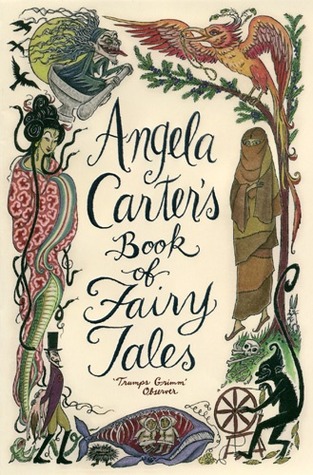 Angela Carter’s Book of Fairy Tales, ed. Angela Carter
Angela Carter’s Book of Fairy Tales, ed. Angela Carter
Read this one for the Cardiff SFF Book Club. I’m not the biggest fan of Angela Carter, having read a couple of her books back during my BA, but I do love fairy tales, so I was ready to give it a go anyway. Turns out, it isn’t a book of fairy tales by Angela Carter (which to be fair, having read The Bloody Chamber, wouldn’t be unexpected), but edited by her. She wrote a fairly scholarly introduction to it, acknowledging colonial bias, etc, etc, and commenting on the content. I’m… probably going to read that again before the book club meeting to see if I want to discuss anything from that angle.
Then comes the collection. The ordering is roughly thematic, although some stories would fit in multiple categories. Despite Carter’s acknowledgement of the limitations of her collection (due to her lack of linguistic skills), it is a pretty diverse collection, with fairy and folk tales from all kinds of cultures and time periods. It’s not just the traditional ones, but variations thereof and whole new stories that are more foreign to a Western audience in their preoccupations (I was a bit puzzled by the mothers turning into lionnesses and dogs forming from their saliva, for example). It can get a little repetitive — a Cinderella story is, ultimately, a Cinderella story: many cultures have it, and we know how it typically goes — but it probably didn’t help that I read this in the space of two days. The tellings chosen are usually fairly clear, and Carter avoided editorialising them too much, so it’s not a chore to read at all. My version does have some proofing errors like missing quotation marks, which was kind of irritating, especially when you’re trying to figure out which character is saying what in some of the more dialogue-heavy sections.
Overall, though, it’s an enjoyable read, and one I’ll keep around. Fairy tales are such a fun way to tell a story: they’ve been evolving so long, so they’re flexible, and they’re so familiar that when you make a change, it’s obvious what that change was and what you want to highlight. It can be a way to write marginalised people back into society, etc… They’re so rich and full of possibility.
Rating: 4/5

I always wanted a place to get into fairly tales.I’m a fiction writer, so it’s important to read the very first roots where a lot of tropes established. This seems like a pretty good starting place.
I also heard Carter is one of the better modern fantasy wrtiers.
I think this might be a good collection, then! It has so many, from all over the world.
I’ve never really considered her a fantasy writer, I guess because in my degree she was always classed as literature. I do need to read more of her work.